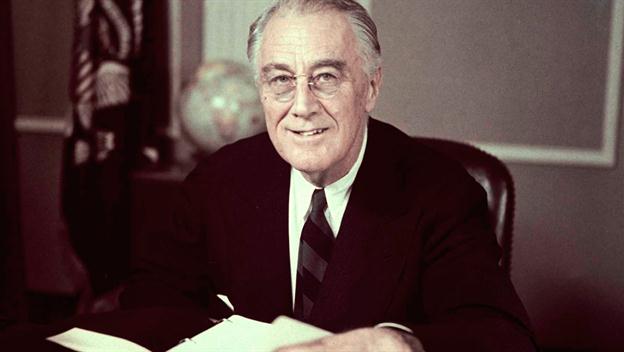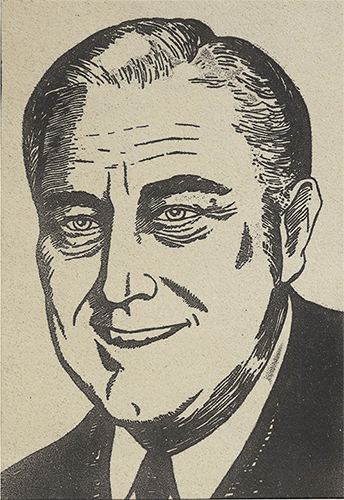People learn a lot of propagandized information from grade school history courses, but perhaps no area has been sanitized quite like the government. At the very heart of the patriotic bias are American presidents, who are romanticized for every youngster to ingest and absorb. That grinds my gears. To cope, I’m providing a weekly installment that reads American presidents to filth and hopefully makes you think a little differently about what constitutes a good president… especially in the four years lying ahead.
Last week you learned all about every Republican’s favorite president, Ronald Reagan. This week you’ll learn about one of America’s top rated presidents.

“A perfectly stupid race can never rise to a very high plane; the negro for instance, has been kept down as much by a lack of intellectual development as much as anything else.”
These words weren’t spoken by Franklin Roosevelt, but by his uncle Theodore. Frankie’s racist and elitist attitude wasn’t too far from his uncle’s however. In his 12 years of presidency he did quite a few things that impacted minorities. I only heard about one of these things in high school, which was the internment of Japanese Americans. Roosevelt’s Executive Order 9066 allowed the forced encampment of west coast Japanese-Americans after the attack on Pearl Harbor. Mysteriously, it was never explained to me why Italian and German Americans were not rounded up in the same large numbers as Japanese Americans.
But Franklin Delano Roosevelt, one of the most celebrated presidents, also had a disdain for black and jews. This post isn’t to deny the popular claim that FDR was one of America’s top three presidents (he did repeal prohibition, after all), but to illuminate some of the things your high school textbooks might have left out.
- During the Great Depression he agreed to let federal funds be locally administered to make southern white people happy. (who were obviously put in charge at the local levels) The funds disproportionately went to white southerners.
- FDR didn’t invite Jessie Owens, who had won four gold medals in the 1936 Berlin Olympics, to the White House. Owens said about the incident:”I wasn’t invited to shake hands with Hitler, but I wasn’t invited to the White House to shake hands with the President, either.”
- Though championed for introducing The New Deal, which provided minimum wage, social security, and other benefits for various vocations, farmers and domestics were not included. It just so happens that farming and domestic work were jobs predominately filled by southern blacks. As a result, they felt the trauma of The Great Depression worse than anyone else.
- The Wagner Act of 1935 made union monopolies legal, which harmed the black workforce. According to economists, “By encouraging unionization, the Wagner Act raised the number of insiders (those with jobs) who had the incentive and ability to exclude outsiders (those without jobs). Once high wages have been negotiated, employers are less likely to hire outsiders, and thus the insiders could protect their own interest.”
- The New Deal encouraged housing discrimination, especially when declaring black neighborhoods unsuitable for mortgages. Planned Communities purposely excluded blacks to maintain segregation.
- When the Tennessee Valley Authority flooded the Tennessee valley and displaced thousands of people, white homeowners were compensated and black tenants were not.
- He appointed KKK member Hugo Black to the supreme court and later claimed he didn’t know he was a member
- FDR refused to support republican initiatives to make lynching a federal crime, claiming southern democrats would block all of his legislation. Lynch rates were soaring across the country after this 1935 move.
- The Roosevelt Administration knew that Jews were being persecuted in Germany, but didn’t respond to American Jewish organizations who wanted them to come here. Instead Roosevelt suggest they go to Ethiopia, Venezuela, or West Africa.
- FDR ordered audits on his political enemies and even ordered the FBI to spy on them. After the Supreme Court ruled wiretapping illegal, FDR told the FBI to keep doing it.
- Roosevelt met with a group of black leaders who wanted to desegregate the navy and the marines, told them he would do it, then did nothing.
Quite a few of the things I just listed would surely make school children look at FDR a bit differently if they knew about them. Franklin Delano Roosevelt clearly cared about maintaining the status quo, making sure he didn’t offend racists by seeming to be too cozy with negroes. We will always rightly remember him for carrying our nation through the depression, but we must remember his faults too. Basically, this great president could have been even greater.
References
Why Did FDR’s New Deal Harm Blacks?
How FDR avoided Supreme Court Justice Hugo Black’s Ku Klux Klan scandal
New Documents Shed More Light On FDR’s Holocaust Failure
Franklin D Roosevelt: The American Franchise
Black Americans and the New Deal (James M. Sears)

